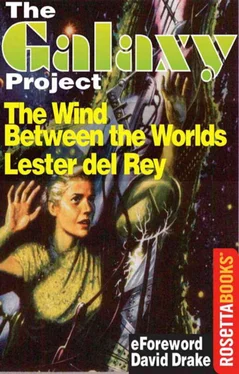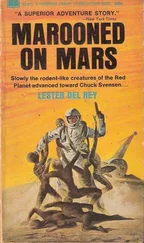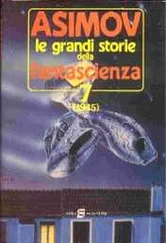Beyond the transmitter building, however, the usual offices and local transmitters across Earth had not yet been built. That would be strictly Earth construction, and would have to wait for an off season. They were using the nearest building, an abandoned store a quarter mile away, as a temporary office.
Pat threw the door open and then stopped suddenly. “Ptheela!”
APlathgolian native sat on a chair, with a bundle of personal belongings around her, her three arms making little marks on something that looked like a used pancake. The Plathgolians had been meat-eating plants once. They still smelled high to Earth noses, and their constantly shedding skin resembled shaggy bark, while their heads were vaguely flowerlike.
Ptheela wriggled her arms. “The hotel found regretfully that it had to decorate my room,” she whistled in Galactic Code. “No other room and all other hotels say they’re full. Plathgolians stink, I guess. So I’ll go home when the transmitter is fixed.”
“With your trade studies half done?” Pat protested. “Don’t be silly, Ptheela. I’ve got a room for you in my apartment. How are the studies, anyhow?”
For answer, the plant woman passed over a newspaper, folded to one item. “Trade? Your House of Representatives just passed a tariff on all traffic through Teleport.”
Pat scanned the news, scowling. “Damn them. A tariff! They can’t tax interstellar traffic. The Galactic Council won’t stand for it; we’re still accepted only on approval. The “Senate will never okay it!”
Ptheela whistled doubtfully, and Vic nodded. “They will. I’ve been expecting this. A lot of people are afraid of Teleport.”
“But we’re geared to it now. The old factories are torn down, the new ones are useless for us. We can’t get by without the catalysts from Ecthinbal, the cancer-preventative from Plathgol, all the rest. And who’ll buy all our sugar? We’re producing fifty times what we need, just because most planets don’t have plants that separate the levo from the dextro forms. All hell will pop!”
Ptheela wiggled her arms again. “You came too early. Your culture is unbalanced. All physics, no sociology. All eat well, little think well.”
All emotion, little reason, Vic added to himself. It had been the same when the industrial revolution came along. Old crafts were uprooted and some people were hurt. There were more jobs now, but they weren’t the familiar ones. And the motorists who gloated at first over cheap Plathgol cars complained when Plathgol wasn’t permitted to supply the improved, ever-powered models they made for themselves.
Hardest of all had been the idea of accepting the existence of superior races. A feeling of inferiority had crept in, turned to resentment, and then through misunderstanding of other races to an outright hatred of them. Ptheela had been kicked out of her hotel room; but it was only a minor incident in a world full of growing bitterness against the aliens.
“Maybe we can get jobs on Plathgol,” Vic suggested harshly.
Ptheela whistled. “Pat could, if she had three husbands—engineers must meet minimum standards. You could be a husband, maybe.”
Vic kept forgetting that Plathgol was backward enough to have taboos and odd customs, even though Galactically higher than Earth, having had nearly ten thousand years of history behind her to develop progress and amity.
The televisor connecting them with the transmitter building buzzed, and Amos’ dour face came on. “Screwball delivery with top priority, Pat. Professor named Douglas wants to ship a capsule of Heaviside layer air for a capsule of Ecthinbal deep-space vacuum. Common sense says we don’t make much shipping vacuums by the pound!”
“Public service, no charge,” Vic suggested, and Pat nodded. Douglas was top man at Caltech, and, a plug from him might be useful sometime. “Leave it on, Amos—I want to watch this. Douglas has some idea that space fluctuates, somehow, and he can figure out where Ecthinbal is from a sample. Then he can figure how fast an exchange force works, whether it’s instantaneous or not. We’ve got the biggest Earth transmitters, ‘so he uses us.”
As they watched, a massive capsule was put in place by loading machines, and the light changed from yellow to red. A slightly greenish capsule replaced the other. Amos signaled the disinfection crew and hot spray hit it, to be followed by the ultrasonics. Something crackled suddenly, and Amos made a wild lunge across the screen.
The capsule popped, crashing inward and scattering glass in a thousand directions. Pressure-glass; it should have carried a standard Code warning for cold sterilization and no supersonics. Vic leaped toward the transmitter building.
Pat’s cry brought him back. There were shrieks coming from the televisor. Men in the building were clinging frantically to anything they could hold, but men and bundles ready for loading were being picked up violently and sucked toward the transmitter. As Vic watched, a man hit the edge of the field and seemed to be sliced into nothingness, his scream cut off, half-formed.
A big chunk of glass had hit the control, shorting two bus-bars, holding them together by its weight. The transmitter was locked into continuous transmit. And air, with a pressure of fifteen pounds per square inch, was running in and being shipped to Ecthinbal, where the pressure was barely an ounce per square inch! With that difference, pressure on a single square foot of surface could lift over a ton. The poor devils in the transmitter building didn’t have a chance.
He snapped off the televisor as Pat turned away, gagging. “When was the accumulator charged?”
“It wasn’t an accumulator,” she told him weakly. “The whole plant uses an electron-pulse atomotor, good for twenty years of continuous operation.”
Vic swore and made for the door, with Pat and Ptheela after him. The transmitter opening took up about two hundred square feet, which meant somewhere between fifty and five hundred thousand cubic feet of air a second were being lost. Maybe worse.
Ptheela nodded as she kept pace with him. “I think the tariff won’t matter much now,” she stated.
Vic’s action in charging out had been pure instinct to get where the trouble lay. His legs churned over the ground, while a wind at his back made the going easier.
Then his brain clicked over, and he dug his heels into the ground, trying to stop. Pat crashed into him, but Ptheela’s arms lashed out, keeping him from falling. As he turned to face them, the wind struck at his face, whipping up grit and dust from the dry ground. Getting to the transmitter building would be easy—but with the wind already rising, they’d never be able to fight their way back.
It had already reached this far, losing its force with distance, but still carrying a wallop. It was beginning to form a pattern, marked by the clouds of dust and debris it was picking up. The arrangement of the shields and entrances in the building formed a perfect suction device to set the air circling around it counter-clockwise, twisting into a tornado that funneled down to the portals. Men and women near the building were struggling frantically away from the center of the fury. As he watched, a woman was picked up bodily, whirled around, and gulped down one of the yawning entrances. The wind strangled her cries.
Vic motioned Pat and Ptheela and began moving back, fast. Killing himself would do no good. He found one of the little hauling tractors and pulled them onto it with him, heading back until they were out of the worst of the rising wind. Then he swung to face Ptheela.
“Galactic rules be damned, this is an emergency, and we need help! What now?”
Читать дальше












